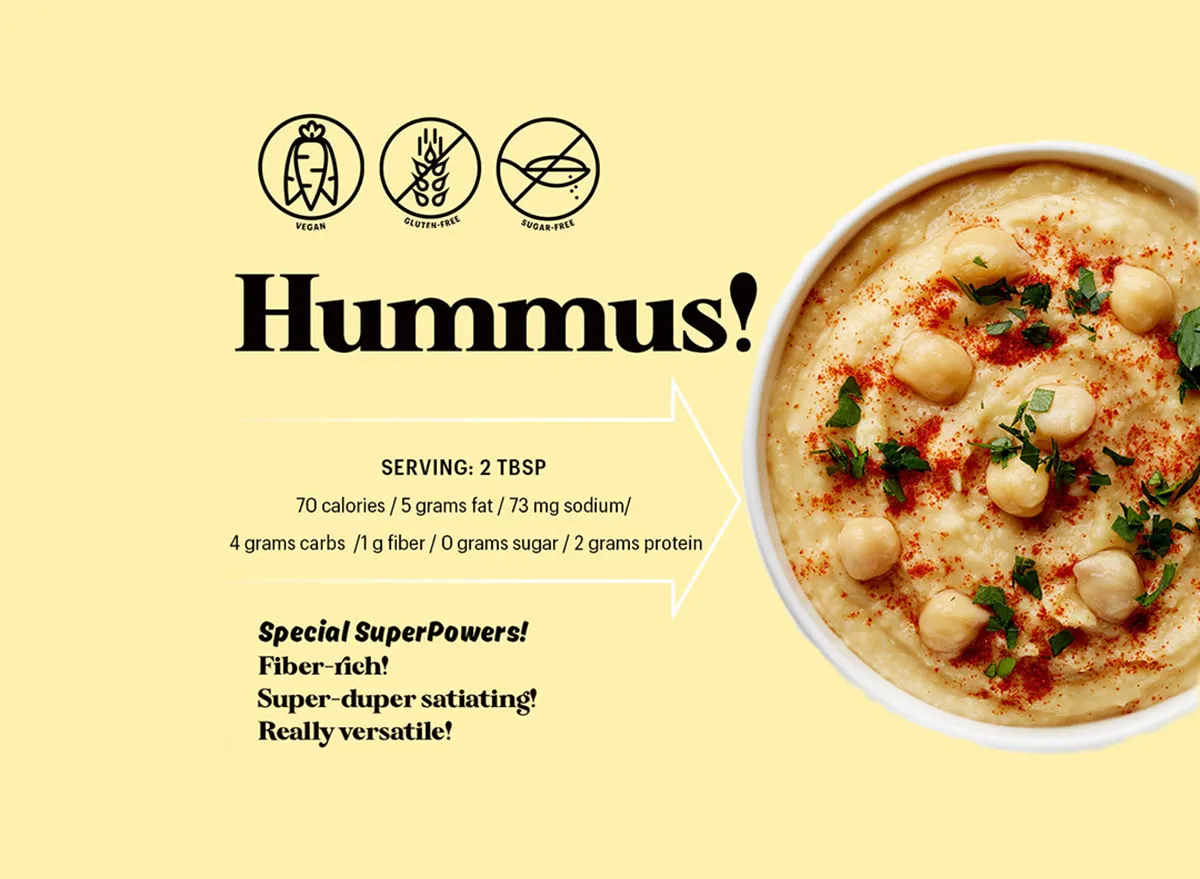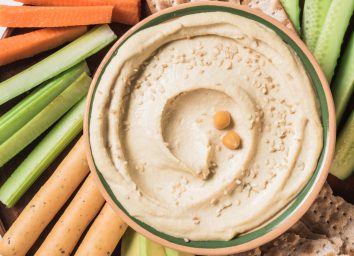
Whatever you you call hummus ("a baby carrot's BFF," "Mediterranean mayo," "Chickpea pâté"…), there's no denying that the Middle Eastern culinary staple is well on its way to overthrowing guacamole and ranch as the most-beloved dipping sauce and spread on the planet.
But, even as you continue to indulge your long-standing love affair with hummus, there may still be some questions lurking in your mind about its nutritional breakdown. Like, "Can I eat it if I'm on a specific diet?" and "Can it possibly be as good for me as it is for my taste buds?"
Now, you can fact-check all those doubts with the info below.
Is hummus healthy?
Hummus, in essence, is just mashed up chickpeas. Traditionally, a little bit of olive oil, garlic, lemon juice, salt, tahini, and some spices are added to this creamy base as well. None of the ingredients in hummus raise the "unhealthy" red flag. On the contrary, thanks to it's head honcho ingredient (chickpeas), hummus is a macro- and micro-nutrient goldmine. The important key? Eating it in moderation.
Okay, so what is the actual nutrient content in hummus?

Glad you asked. Let's turn to the numbers that tell all.
Here's what's in one serving (about 2 tablespoons) of plain 'ol hummus, according to MyFitnessPal:
- Calories: 70
- Fat: 5 g
- Sodium: 73 mg
- Carbohydrates: 4 g
- Fiber: 1 g
- Sugar: 0 g
- Protein: 2 g
Basically, with filling fiber, healthy fats, and quite a bit of protein, hummus is pretty much the perfect snack.
With 2 grams of muscle-building protein per serving, hummus delivers a heartier dose than most plants and even animal-based foods, making it a solid choice for vegans, vegetarians, and carnivores alike. (For comparison, a wo-cup serving of spinach has less than 1.5 grams of protein.)
Hummus is pretty high in fiber, the nutrient responsible for making you feel satiated. For the 95% of Americans who don't regularly consume the recommended amount of fiber (25 grams a day for women and 35 grams a day for men) this is a serious win.
The 5 grams of healthy fat further add to the spread's satiating power, a key component in *not* overeating.
Worth mentioning: Hummus is also reasonably high in vitamins and minerals like iron, folate, phosphorus, vitamin B, vitamin K, zinc, copper, manganese, magnesium, choline, and selenium.
Does anything change if the hummus is flavored?
Now that hummus has reached near cult-favorite status, there are practically more flavors of hummus than there are of ice cream. Avocado, spinach-artichoke, beet, roasted red pepper… did you know there's even dessert-flavored hummus at this point? Yep, wild!
It's easy to wonder if all the added flavor somehow makes the dip any less healthy. The short answer is: No. But, check the nutrition label. If there's more than 5 grams of sugar or 100 grams of sodium per two tablespoon serving (or ingredients you don't recognize), put it back. Get our picks for best store-bought hummus brands here.
What are the main drawbacks of hummus?
The one problem with hummus is that most people fall into the same trap eating it as they do when snacking on nut butter or ice cream: Scooping it straight out of the container can result in having way more than one serving. While hummus isn't unhealthy, it does have a decent amount of calories and fat. Chowing down on a whole tub (oops) can put you over 500+ calories and 35+ grams of fat, depending on the container's size.
Your move: scoop some into a bowl and dip from there. Or, buy some pre-portioned packs if you don't make your hummus at home.
Another thing to be mindful of is what you pair with your hummus. If you use pita bread, crackers, chips, or pretzels, the calorie and carb intake will add up quickly. You might opt instead to dip with raw veggies like carrots, celery, peppers, broccoli, or cauliflower.
Who is hummus good for?
For the general population, hummus is a healthy bet, but there are certain eating plans and diets that don't allow the creamy spread. Hummus is not paleo– or Whole30-approved because chickpeas are legumes, which are not permitted on these diets. Legumes are also generally restricted on the super lower-carb diets due to their high carb contents, so hummus is not allowed on the keto diet, Atkins diet, or South Beach diet either.
Hummus is, however, (drum roll please) allowed on vegan and vegetarian eating plans. It's also compliant with diets that limit sugar and/or cut out gluten (there's no gluten in hummus!) or dairy.
The bottom line on hummus
Dip away! Provided you're only consuming one or two servings—and not ten—hummus is a food your body will benefit from having every single day.








